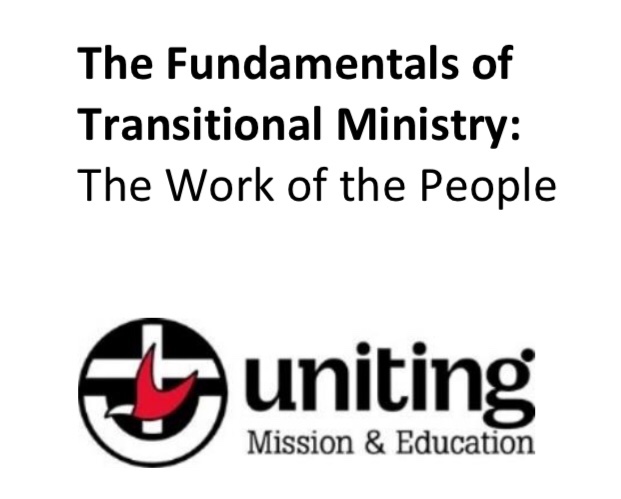Over recent months, Elizabeth and I have occupied what might be called a liminal space. Liminal spaces are the places of transition, from one place to another.
We have moved states—indeed, we have travelled the length of the continent, relocating from a Perth suburb just a few kilometres inland from the Indian Ocean, to a suburb in Canberra, in the anonymous territory that is hiding in the midst of the undifferentiated eastern states (at least, that’s how the sandgropers of WA view them).
We have moved house, to a residence that the church has recently purchased. That meant packing everything into boxes in WA, then waiting for delivery to the ACT, where we then unpacked everything and found new places for each item, each book, each piece of furniture.
We have also changed jobs, in association with this domestic move. We have each ended the work that we have been doing in Western Australia in recent times—for Elizabeth, a year-long Intentional Interim Ministry in a Congregation, and some months of resourcing of the Presbytery Pastoral Relations Committee; for myself, two years of restructuring and rebuilding the educational offerings and formation processes within the Synod. That has meant a series of farewells with colleagues in WA.
We are now both settled into congregational ministry—for Elizabeth, in a regular placement, and for myself, as an Intentional Interim Ministry in a Congregation which has experienced a series of challenges in recent times. That means introductions, getting to know new people, and sussing out the key issues in each place. This is a challenging place for us each to be!
And this week, we are both “trainers-in-training” at a course on The Fundamentals of Transitional Ministry. This is part one of a two-part course, auspices by the Interim Ministry Network (based in the USA, but taught with an Australian accent for the Australian context by our colleague, Rob McFarlane). You can see more about this network at http://imnedu.org/

Part One of the course is subtitled The Work of the People. Part Two (scheduled for June) is subtitled The Work of the Leader. The two courses complement and inform each other.
The Basis of Union of the Uniting Church articulates a commitment to this process of change and transition. Obviously the motif of “a pilgrim people on the way” (para 3, also para 18) is a key motif, and the Basis refers explicitly to persevering through the “changes of history” that we experience (para 4). There is great encouragement for us to develop creative new expressions of church in another obvious phrase, referring to “fresh words and deeds” (para 11). So this should be fundamental to the way we operate as a church.
It is clear that Ministers undergo a process of change and transition in moving from one placement to another: moving through ending in one community, and leaving behind the ministry exercised there; to joining a new community and coming to understand and appreciate the context within which ministry now takes place. (And then, of course, exiting the community at the end of the period of ministry.) As well as all of the learnings, adjustments, developments, readjustments, further learnings, reshaping and continuing developments that are inevitable within the course of a good ministry placement.
Alongside this, the Congregation or faith community has work to do, and this is recognised in the second course. This work entails a series of tasks, which the Intentional Interim Minister is charged with overseeing and stimulating. These are summarised quite succinctly as dealing with understanding heritage, refreshing leadership, relational connections beyond the community, developing missional identity, and committing to the agreed future. That’s quite a lot of work!
So, all of these changes that we have experienced in recent times—changes in jobs, changes in residence, changes in location, and changes in the faith community to which we are connected—all bring challenges with them. We are in what anthropologists and sociologists call, a liminal space.
The word liminal comes from the Latin word līmen, which means “a threshold”. Technically, that is the place that marks off one space from another. Its origin was the strip of wood or stone at the bottom of a doorway, which was crossed in entering a house or room.
The thresh is the place where one treads as one enters a room. So the threshold, is where you put your foot as you walk into a new room or new place.
So, we are on the threshold, in a liminal space.
Anthropologists define liminality as “the quality of ambiguity or disorientation that occurs in the middle stage of a ritual”. It is the moment when participants no longer hold their preritual status but have not yet begun the transition to the status they will hold when the rite is complete.
During a rite’s liminal stage, participants “stand at the threshold” between their previous way of structuring their identity, time, or community, and a new way, which completing the rite establishes.
The concept of liminality was developed in the early twentieth century sociologists. It was applied particularly to religious rituals marking the movement of a person from one stage to another. We can see this in the traditions of the church: for instance, Confirmation as a move into adulthood, Marriage as a move into long term partnership, and, of course, Baptism as the movement into life outside the womb, in the world as we know it, and Funerals as the move into life beyond death, life in the world beyond that as we currently know it. These are liminal moments for all human beings.
More recently, usage of the term has broadened to the political and cultural arena, alongside the religious or faith area. So it is a useful concept to be applied to the places where we are ministering and the changes that are among place, or need to take place, within those communities.
During liminal periods of all kinds, the experts tell us, “social hierarchies may be reversed or temporarily dissolved, continuity of tradition may become uncertain, and future outcomes once taken for granted may be thrown into doubt. The dissolution of order during liminality creates a fluid, malleable situation that enables new institutions and customs to become established.”
[I found this on Wikipedia, which references the source as Agnes Horvath, Bjørn Thomassen, and Harald Wydra, Introduction: Liminality and Cultures of Change (International Political Anthropology 2009). Accessed 18 March 2019.]
That means, then, that we are facing opportunities at this moment, in the liminal space—opportunities to dissolve traditions, opportunities to reshape practices, opportunities to cast doubt over long term certainties, opportunities to lay down new patterns of functioning that will be healthy, life giving, and resilient in the longer term. Now that’s a set of challenges to be met!!!



One thought on “On the threshold, in a liminal space”